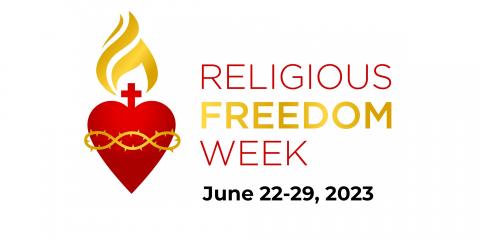
Every Jan. 16 since 1993, the president of the United States has proclaimed National Religious Freedom Day, commemorating the day the Virginia statute for religious freedom was signed into law on Jan. 16, 1786. The First Amendment of the United States Constitution states, “Congress shall make no law respecting an establishment of religion or prohibiting the free exercise thereof …”. Religious freedom is a big deal in the United States.
The Catholic Church in the United States annually celebrates “Religious Freedom Week,” a whole week dedicated to religious freedom. The week begins on June 22, the feast day of Saint Thomas More and Saint John Fisher, and concludes on June 29, the solemnity of Saints Peter and Paul. During this week of heightened awareness, the United States Conference of Catholic Bishops invites Catholics to pray, reflect, and act in such a way as to promote religious freedom. Such freedom allows the Church – and indeed all religious communities – to live out their faith publicly, thus serving the good of all.
John Fisher and Thomas More were Englishmen who lived in the 15th and 16th centuries. Thomas More was the lord high chancellor of England, while John Fisher was the bishop of Rochester. They both got into trouble for opposing King Henry VIII’s divorce of his wife Catherine of Aragon. Ultimately, their refusal to sign an oath of supremacy, declaring King Henry as supreme head of the Catholic Church in England, led to their executions in 1535. Pope Pius XI canonized them 400 years later. These men gave their lives for the freedom of the Church and for freedom of conscience. They bear witness to the truth that no government can make a claim on a person’s soul. But that doesn’t stop governments from trying to do so.
Here are a few examples: There is severe religious persecution in China, Nigeria, Sri Lanka, Mozambique, Pakistan, India, and Nicaragua. This list is by no means an exhaustive one. The persecution can be carried out by the government itself or by rival religious groups within the country. In Africa alone, 5,898 Christians were killed because of their faith in 2022. (Open Doors USA) Moreover, Christian communities in the Middle East have been nearly wiped out in the last few decades by war and targeted violence. Religious Freedom Week invites us to pray, reflect and act upon these things.
Other examples of encroachment on religious freedom seem minor in comparison, but they are no less real. In March, the British Parliament rejected attempts to allow silent prayer outside abortion clinics in England and Wales. A Catholic woman had been arrested days earlier for silently praying outside an abortion clinic. So much for Jesus’ exhortation to “pray always.” (Lk 18:1)
Earlier this year, an Oregon woman was denied the opportunity to adopt a child because she refused to express support for gender ideology and same-sex attraction. Her religious convictions ran afoul of the state’s Department of Human Services “regulations.”
Here in Michigan, at the time of this writing, there is a bill which has passed the full House (after passing the Senate in March) that would equate abortion to giving birth when it comes to what benefits employers offer to their employees. The Michigan Catholic Conference said that the bill “would violate the constitutional rights of employers who do not want to support or pay for their employees’ abortions. … No one should be forced to support another person’s choice to have an elective abortion – financially or otherwise.” (MCC’s Catholic Advocacy Network)
These are just a few examples of why we Catholics need to be promoting Religious Freedom Week. It invites us to pray, reflect and, most importantly, ACT. We must care about these matters not simply because they affect Catholics. Infringement of religious freedom touches Judaism, Islam, Hinduism, and potentially all religions. The Second Vatican Council taught that every human person has a right to religious freedom and to be immune from human coercion in civil society. (Dignitatis humanae) Let us be attentive to what is going on around us and respond with respect, yes, but also with Christian conviction.
Most Reverend David Walkowiak, the 12th bishop of the Catholic Diocese of Grand Rapids.
Grand Rapids | June 2023 | GRdiocese.org
To read more about Religious Freedom Week, click here.




